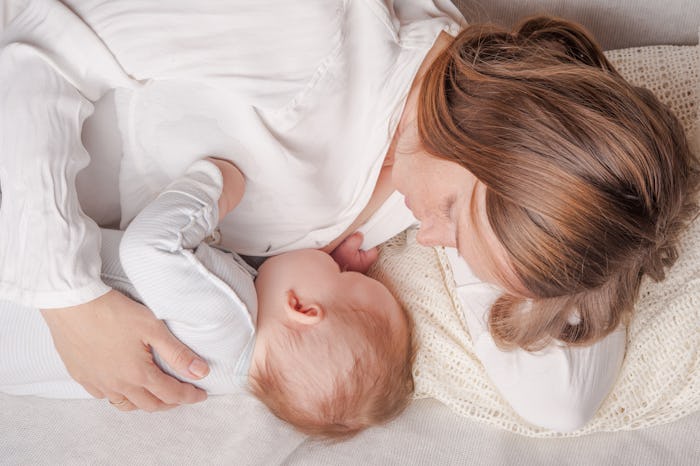Life

7 Tips For Safe Bed-Sharing
Although bed-sharing was long labeled as unsafe and dismissed as "bad parenting" by most official parenting guidance, in recent months, there seems to be a push towards educating parents how to safely bed-share, instead of simply dismissing it altogether. According to The Natural Child Project, bed-sharing is the norm worldwide (and has been for thousands of years, in fact), and more parents practice the sleep method in the US than you'd think.
Baby Center noted that for many parents, bed-sharing is the only way that both baby and parents can enjoy even a few hours of uninterrupted sleep. Aside from strengthening the bond between you and your baby, bed-sharing can be amazing for breastfeeding moms as well. The term "breastsleeping" was coined by the founder of the Mother-Baby Behavioral Sleep Laboratory at the University of Notre Dame, with hopes to normalize bed-sharing for breastfeeding mothers, educating them about the benefits of the practice for both mothers and babies.
So if you feel that bed-sharing (or breastsleeping, or co-sleeping, or whatever you choose to call it,) is right for you and your family, making sure that you and your partner are educated on doing it safely is the first step to a great bed-sharing experience — and ultimately, a great night of sleep.
1Keep Your Baby Away From Second Hand Smoke
It doesn't sound like it immediately relates to sleep, but according to Baby Center, exposure to secondhand smoke — both in utero and after birth — is extremely dangerous for babies, raising their risk of SIDS. The Mother-Baby Behavioral Sleep Laboratory noted that ensuring your baby isn't exposed to cigarette smoke is the first step in ensuring safe sleep.
2Breastfeed As Often As You Can
Breastfeeding, as it turns out, is another essential for safe bed-sharing. According to the Mother-Baby Behavioral Sleep Laboratory, breastfeeding significantly reduces a baby's risk of SIDS. Furthermore, La Leche League International noted that breastfeeding helps regulate the mother and baby's sleep cycles, and allow mothers to be more attentive to the baby's needs.
3Make Sure Both Parents Are On The Same Page About Bed-Sharing
It makes sense that having both parents informed and on board with bed-sharing is vital as well. Even though the baby will likely spend most of the night next to the mother — especially if you're breastfeeding — it's important for everyone in the bed to be informed, according to the Mother-Baby Behavioral Sleep Laboratory.
4Have A Firm Mattress
Kids Health noted the importance of making sure your mattress is both firm (no water bed. Sorry 1998.) and fitted properly to the frame and headboard. This ensures that your baby won't accidentally slip down in between the mattress where they could be injured or suffocate.
5Keep Baby On Their Back
The gold-standard rule of infant sleep safety applies no matter where they sleep. According to Parents, placing your baby on their back to sleep is the safest and easiest way to prevent SIDS.
6Toss Out Extra Pillows, Blankets, Or Padding
The Mother-Baby Behavioral Sleep Laboratory stated that fluffy blankets, or excessive pillows (other than what the parent will keep under their head,) should be avoided when bed-sharing. The same goes for the bedding you use on your bed.
7Stay Away From Couches
Although it may seem like a safe idea, bed-sharing doesn't relate to sleeping with your baby on a couch, recliner, or sofa. Dr. Sears warned parents that sleeping on a couch with your baby isn't as safe as in a bed.